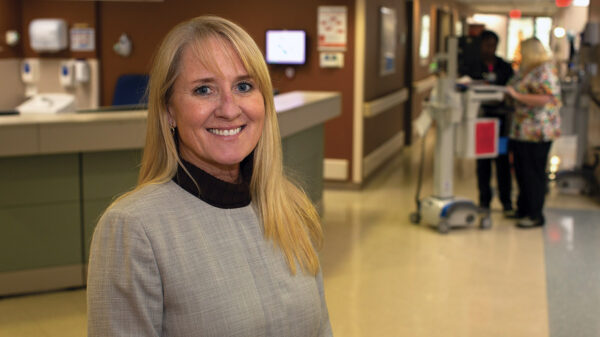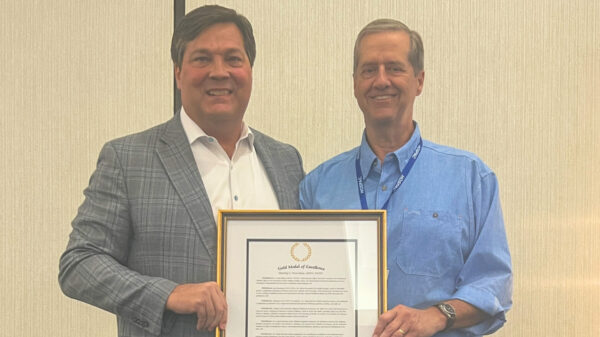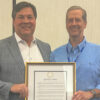The Centers for Disease Control and Prevention on Tuesday recommended that vaccinated people in areas of “high” or “substantial” COVID-19 transmission wear masks when in public indoor settings, and that all teachers, staff and students older than two in K-12 schools wear masks regardless of vaccination status.
All but six Alabama counties are considered at high risk of COVID-19, with four deemed substantial risks and just two considered moderate risks, according to the CDC, which makes the distinctions based upon the rate of cases per 100,000 residents.
Whether or not those recommendations are to be followed in Alabama will be left up to residents and local school boards, however.
“The state of Alabama doesn’t have a plan to do that at this time,” said State Health Officer Dr. Scott Harris, speaking to reporters Tuesday before the CDC announcement about the possibility of a statewide mask mandate. “As the governor said, we expect people to make good decisions. It’s up to them to do what they need to do.”
Gov. Kay Ivey earlier this month said kids should return to class in person and without mask mandates.
“Governor Ivey believes students need to be in the classroom without any type of mask requirement. She continues to encourage all eligible Alabamians to roll up their sleeves and get the vaccine to make COVID-19 a distant memory,” Ivey’s press secretary, Gina Maiola, said in a message to APR.
The CDC change in mask recommendations comes after new data on the delta variant shows that viral loads carried by the vaccinated are approximately as high as those carried by the unvaccinated, meaning the vaccinated can transmit the virus, CDC director Dr. Rochelle Walensky told reporters on a call Tuesday.
“In recent days I have seen new scientific data from recent outbreak investigations showing that that Delta variant behaves uniquely differently from past strains of the virus that cause Covid-19,” Walensky said, also noting, however, that the CDC believes vast majority of transmission is occurring in unvaccinated people and through unvaccinated people.
While so-called “breakthrough” cases among the vaccinated can happen, the odds are very good that the person’s outcome will be much better than if they hadn’t been vaccinated, said UAB’s Dr. Jeanne Marrazzo said Monday.
The CDC’s change mirrors recommendations last week from the The American Academy of Pediatrics that all in K-12 schools should wear masks. Huntsville City Schools on Monday announced a mask mandate for staff and students older than 2, but systemwide mask mandates in Alabama are sparse.
Despite the unlikelihood of a statewide mask mandate, Harris said masks for both the unvaccinated and vaccinated “makes a whole lot of sense,” especially for the older and for those with underlying health conditions.
Harris said with schools about to reopen, he believes it’s inevitable that there will be outbreaks, and said while masks in schools are controversial “they really shouldn’t be.” Masks are an effective way to prevent disease transmission, he said, but the state won’t be requiring them in schools.
“Ultimately, those decisions are going to be left on school boards,” Harris said. “Those decisions aren’t going to be made by the state.”
Asked by APR if the state’s guidance to school will be updated to reflect the CDC’s changes regarding universal masking in schools, Harris said the changes are very likely to be made in the state’s COVID-19 “toolkit” recommendations for K-12 schools.
“Our guidance is going to follow what the CDC has said. I think we’re waiting to see what that guidance is. We’re delaying the release of our toolkit because we anticipate that guidance,” Harris said.
Harris commented on the number of children in Alabama hospitalized with COVID-19, including “at least one infant that I’m aware of.” Those under 12 aren’t currently eligible for vaccines.
There were 26 children hospitalized in Alabama on Tuesday, according to the Alabama Hospital Association, which didn’t have data on exact ages or how many may have been in ICU’s or on ventilators. That’s down from 32 hospitalized children statewide on Monday.
“If nothing else, surely that serves as a message to people who haven’t decided yet about whether they want to get vaccinated,” Harris said. “We hear from a lot of people that ‘It’s my choice not to get vaccinated, and even if I infect someone else, well, it was their choice not to get vaccinated.’ I think that overlooks the fact that we have a lot of Alabamians who don’t have a choice about whether to get vaccinated.”
New COVID-19 cases and hospitalizations statewide have been surging in recent weeks. Harris put much of that to the spread of the more contagious delta variant.
The state’s COVID-19 hospitalizations broke 1,000 for the first time since early February, reaching 1,083 on Tuesday, a 430 percent increase from July 1. Tuesday’s hospitalizations increased by 167 patients from Monday, which was the largest single-day increase since Jan. 3.
“We’ve not seen numbers like this since February,” Harris said.
{{CODE1}}
Dr. Don Williamson, president of the Alabama Hospital Association and a former state health officer, told APR that Tuesday was the first day since February when the state’s supply of ICU beds fell below 200. Just 175 were available statewide on Tuesday, when 286 of the day’s hospitalized COVID-19 patients were in the ICU, and 103 of those on ventilators.
Alabama also added 2,667 new confirmed cases on Tuesday, Williamson said, a daily increase the state hasn’t seen since Jan. 30. Alabama’s seven-day average of new daily COVID-19 cases by date of infection rose by 434 percent from July 1 to Saturday, from 228 new cases daily to 1,219.
“This virus is so much more infectious than any of us realized,” Williamson said.
{{CODE2}}
COVID-19 deaths in Alabama haven’t seen the same rise, but Harris said experience has taught that deaths lag behind new cases and hospitalizations.
“So we are not looking forward to that happening, but we do expect that,” Harris said.
Alabama has the lowest percentage of fully vaccinated residents in the nation, at 34.1 percent, according to the CDC.
“Well over 95 percent, but probably closer to 99 percent, of their hospitalizations are occurring in the unvaccinated people, and our deaths overwhelmingly are occurring in unvaccinated people,” Harris said. “The most effective way to prevent COVID is to get vaccinated. Period.”
Asked whether the Alabama Legislature’s passage of a “vaccine passport” ban, which prevents barring access to schools and businesses due to immunization status, is at odds with the state’s call for more vaccinations, Harris said “we play the hand we’re dealt.”
“The Legislature has in its power to create these rules. They don’t feel that we ought to be asking about vaccination status, so we’re just trying to do our best to take care of people any way we can,” Harris said.























































